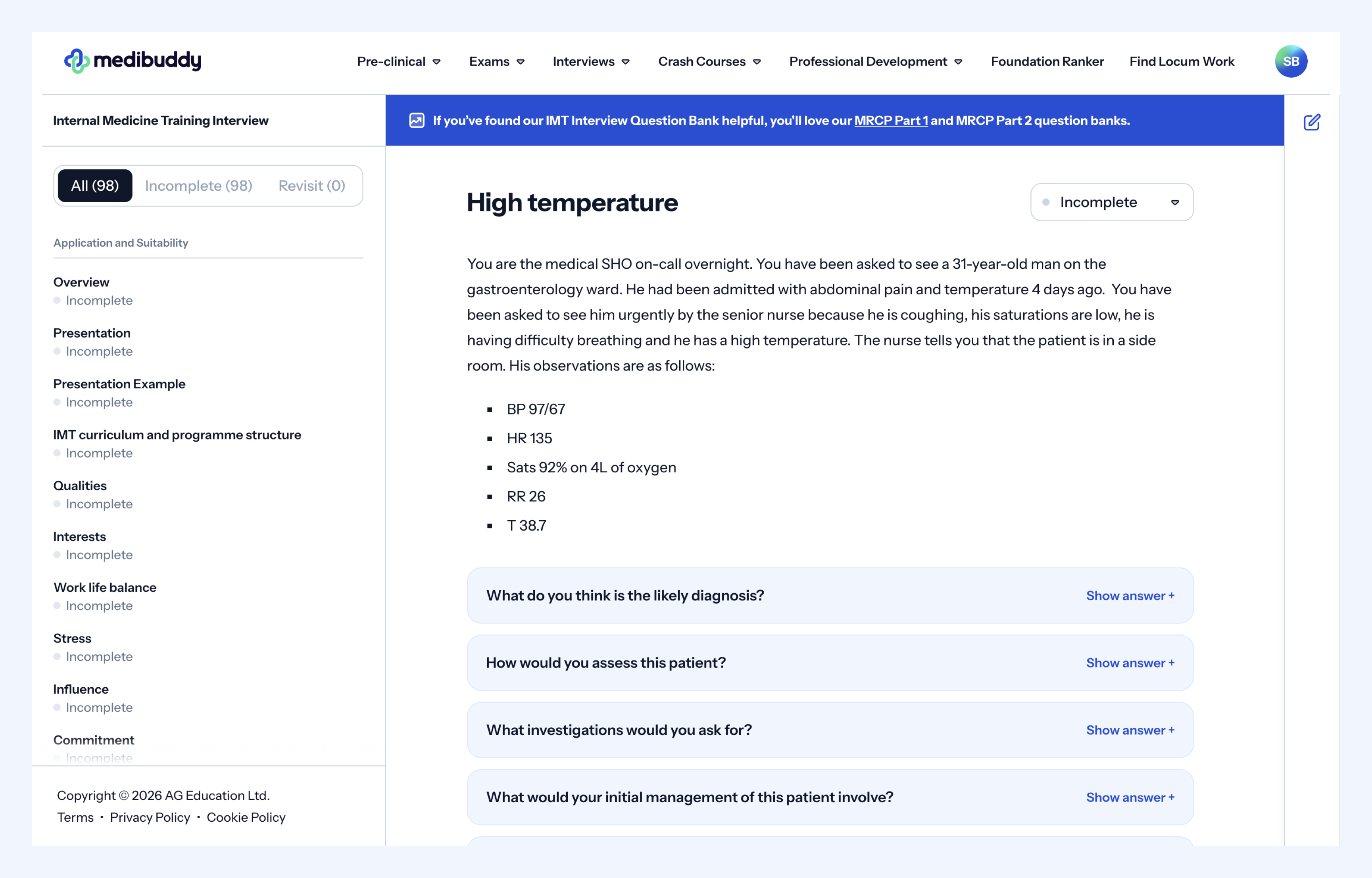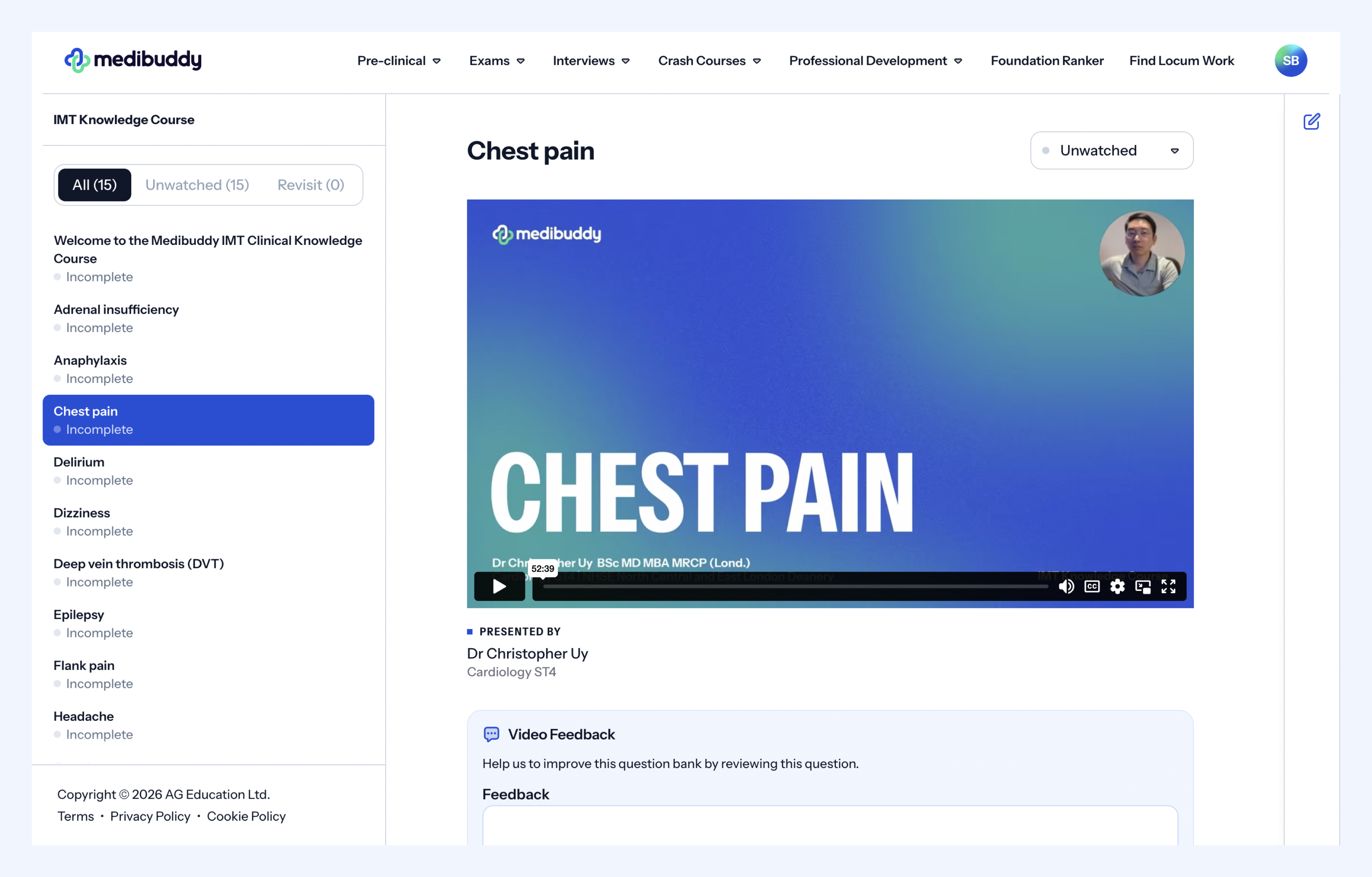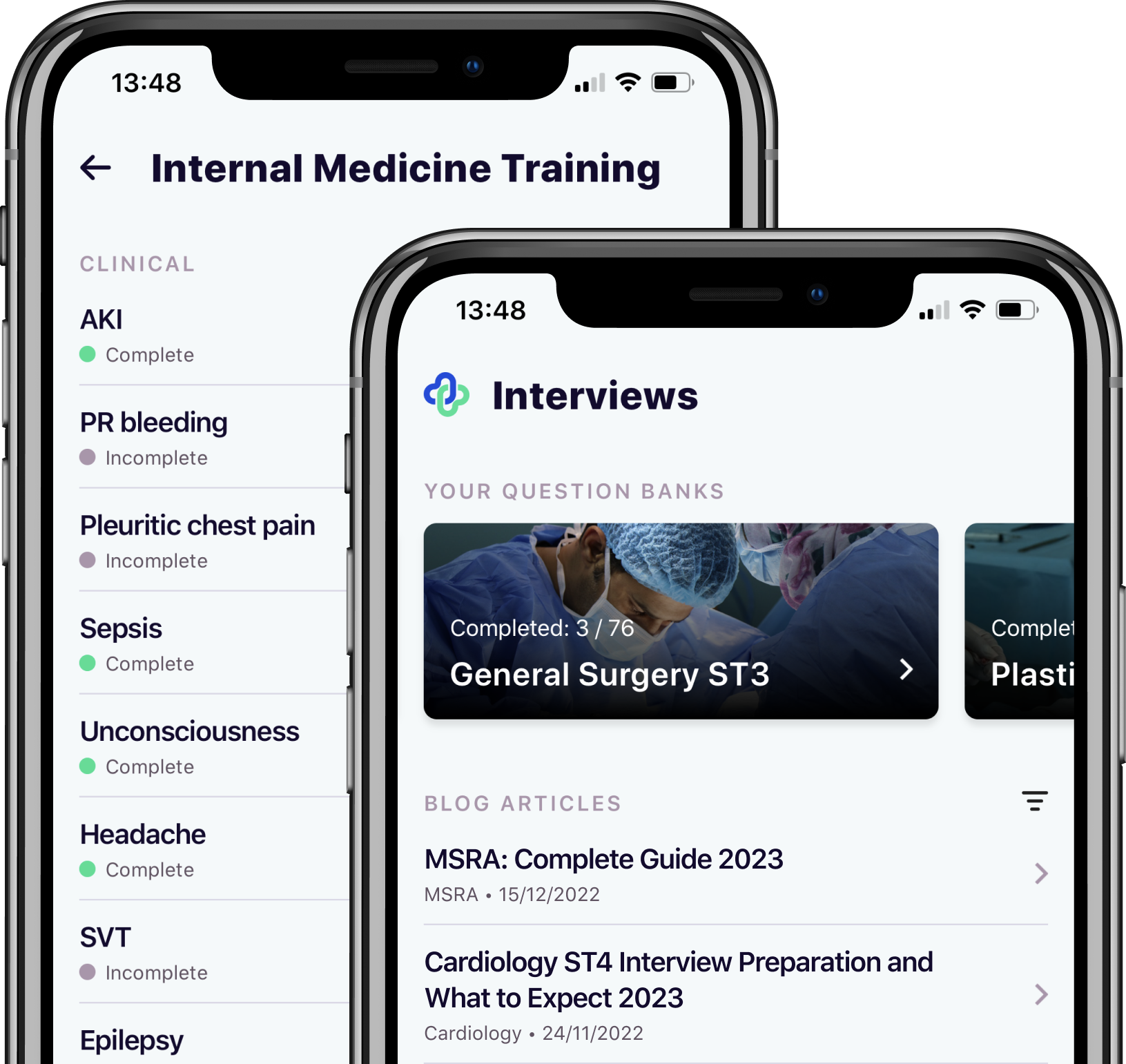
UK Internal Medicine Training Interview Tips for 2026
Congratulations on applying for the UK Internal Medicine Training (IMT) Interview! You’ll soon start your interview preparation and we’ve written this post in combination with our IMT Interview Question Bank and IMT Knowledge Course to help you get the best score possible.
Just making the decision to apply means you have started on the path to a career in clinical medicine. Take a moment and think about it. It’s scary but exciting. The rest of your career lies before you. With the application completed, your mind turns to the next hurdle, the interview, the most important point of the application process and the bit that needs practising.
The interview is often the stage that applicants find most stressful. Understandably, there is pressure that comes from sitting in a room with three or four consultants asking you questions, but it shouldn’t be stressful.
The most important thing to remember is that the people sitting on the other side from you want you to succeed. They are on your side. What they are asking isn’t difficult, but the stress of the situation can do funny things to your brain. Remind yourself of that when the bell goes and your time begins. Take two deep breaths and clear your mind. You’ve got this!
Key things to remember for the Internal Medicine Training Interview
Before we even think about the internal medicine interview and the different stages, remember a few simple rules. To sail through the interview, you need to do three things:
- Be safe – the people interviewing you are consultants and the people you will be working for. They are looking for candidates they can trust to be on-call and look after their patients. They want to know that you can think under pressure and make decisions whilst not overreaching yourself. They want to see that you know your limits and understand when it’s the right time to call for help. The candidate who can answer all the questions but cannot recognise when they are out of their depth is not the doctor the consultant will want working for them!
- Be polite – in addition to being safe, the consultants want to find candidates that they would like to work with. Medicine is a team game and finding players that buy into that is important to your bosses. Being dressed appropriately, being courteous as you enter the room and thanking your interviewers as you leave are all important. Make sure you listen attentively and look the interviewer in the eye when answering. Looking at the floor or around the room certainly won’t help you get the job!
- Be prepared – you know what is coming so don’t be surprised when you get there. Ensure you are ready on time so you don’t add extra stress to your day. Practising the sort of questions you will get will help you to feel comfortable with the style and layout of the interview and prepare you for that tricky question at the end. If you know what is coming, you can be calm and collected, and points one and two above will come naturally.
Key Dates for IMT
The deadline for your IMT application is at 4pm on Thursday 20 November 2025. If you are looking to apply for the next round, thinking about the interview, its layout and structure, are all important when putting together your application, as discussed in other posts, so start thinking about it from the beginning.
Shortlisting for interviews is by Wednesday 17 December 2025, with invites to interview sent out by Thursday 18 December 2025. Remember to keep an eye on your email during this period, as once invites are sent out, it is down to each applicant to book their own slot. Interviews will be held from Monday 12 January to Friday 13 February 2026. The booking process is first-come-first-served, so doing this at the earliest opportunity will ensure you get a time and location that suits you, and remove another layer of unnecessary stress (particularly important if you already know that you are away for some of this period). Early booking will also mean you can warn your clinical team in advance of when you will be away. You should be able to take this leave as study leave if you are in a programme, and don’t forget to ask for a few days off before for interview preparation!
Offers will then be sent on Tuesday 24 March 2026.
The exact timeline for the 2026 application can be found here in our applying for IMT blog post.
Preparing for your IMT Interview
As you’re putting together your application, it’s worth finding out who amongst your colleagues is also thinking about applying for IMT as they are going to be your best friends during your interview preparation. Practising together will let you rehearse your answers out loud.
A good way to practice and help you understand where the interviewers are coming from is to examine someone else’s portfolio or application (now the portfolio is a virtual self assessment) and then ask them questions about it. A simple way to prepare for the interview is to record yourself speaking your answers out loud and watching them back. No one else is going to see, so don’t be embarrassed. It will definitely make you feel more comfortable on the day as your mind and body will know you’ve done it before.
Spend time using interview question banks to identify areas of your knowledge that need a little more work. The Medibuddy IMT question bank includes scenarios written by previously high scoring IMT trainees covering all parts of the syllabus, and will help you prepare for the style of questions that will come up. Here is an example of a clinical scenario from our question bank.

The 2026 interviews will be held online via Qpercom Recruit. Therefore, ensure you have a suitable place to undertake it from and have checked that your tech is up to the job. It is important for candidates to consider:
- Microphone and camera – make sure that you’ve checked that these are working in advance. This is certainly not something you want to be stressed about on the day. Consider the position of the camera – often it’s better to use a webcam that can be positioned ahead of you, rather than a camera on your laptop, for example. Ultimately, find what works best for you so you can be seen and heard clearly.
- Internet connectivity – this goes without saying, you will need to make sure that you are somewhere with good internet connectivity.
- Background – be aware of your background and try to make sure your backdrop is clear. There are functions to blur your background, but it is definitely better to think about this in advance.
- Environment – you will need to be in a well-lit and quiet space. If there are others in the house, give them a heads up as to when your interview will be so there will be no interruptions!
The IMT Interview
The structure of the IMT interview has remained the same; however, as of the 2026 interview cycle, applicants will also be evaluated on their communication skills in Station 1. There will still be three main question areas, but these will be split across two stations, each lasting 11 minutes. The total interview time, including time between stations, will be around 30 minutes. You will be scored on the following 6 areas:
Station 1:
- Application and achievements
- Suitability for IMT
- Ethical, professionalism and governance scenario
- Communication mark
Station 2:
- Clinical scenario – Investigations/diagnosis/management
- Clinical scenario – Communication mark
- Clinical scenario – Handover
The three main question areas are as follows:
- Station 1, Question 1 – Application and suitability for IMT – 6 minutes: The first question is divided into two sections: presentation and questions.
- The presentation will last 2 minutes and you must discuss the following: “Give an overview of your achievements to date which are most relevant to your application to be a trainee in internal medicine”.
- You only have 2 minutes, so use this time wisely. Prepare your presentation beforehand, breaking it down into headings and brief explanations of your achievements. Don’t just list them, explain their relevance. Think about achievements that demonstrate transferrable skills useful for IMT.
- You will then be asked questions about your suitability for IMT. Review your application in case you are asked any questions about the information provided here.
- Station 1, Question 2 – Ethical, Professionalism and Governance Question – 5 minutes: You will be given this immediately following the clinical scenario (so no preparation time). It may be related to the previous scenario or may be completely separate. The interviewers will want to see you consider the moral, ethical or legal implications of the scenario given. Five minutes is not a long time, so this is not a deep dive into medical ethics. Be sure you know your stuff on issues an IMT trainee would be expected to deal with; for example, mental capacity, decisions relating to DNACPR, patient confidentiality, patient safety incidents and reporting (DATIX), conflicts/issues with colleagues and how to escalate appropriately, and familiarise yourself with the GMC’s Good Medical Practice guide.
- Station 2, Question 1 – Clinical scenario and patient handover – 10 minutes + 1 minute: The scenario will be given to candidates after station 1, with an additional three minutes to review this, before up to 10 minutes for questions relating to it. The questions will focus on assessment, diagnosis and management, followed by communication and appropriate escalation questions. The scenario is likely to be short, with limited information. Candidates should use the time available to them to consider the salient points and, in most cases, start thinking about a list of differential diagnoses, as this will help shape the first part of the question. Candidates will then be given 1 minute to hand over the patient to a ‘colleague’ (played by one of the interviewers). Given that you know this will happen, it would be worth familiarising yourself with common handover techniques such as SBAR. With each clinical scenario you undertake on Medibuddy, finish with a timed 1-minute summary. You’ll soon have this part of the scenario well practised and have no problems come the interview. Two marks are available, one based on your investigations, diagnosis and management of the patient, and the second based on your ability to handover.
When answering these types of questions in section 1, it’s worth thinking about what qualities you have that make you suited to a career in clinical medicine. Come up with a list of them and try to weave them into your answer. These could include things like:
- Knowledgeable
- Team player
- Good communication
- Willingness
- Adaptable
You’ll have your own skills and values that you’ll want to show off, so write them down and think about how you can work them into your answers (much better than just providing a list).
Our IMT Knowledge Course is structured around 14 targeted topics, delivering over 8 hours of in-depth content to strengthen your understanding of internal medicine and refine your interview preparation. You can even save £30 on the question bank when you purchase the knowledge course at the same time.

Timings
As you can see, there is not a lot of time to fit in a lot! The key, therefore, is not to panic. The interview is not a race. You likely have lots of things you would like to talk about, but the trick here is to talk up the most important elements that show why you’re a great fit to be an IMT trainee. Be selective!
If you’re considering General Internal Medicine training in Ireland, the BST GIM interview lasts around 15 minutes and includes five questions. For the full breakdown, see our BST GIM Application and Interview Guide.
Scoring for the IMT Interview
There are seven areas during the interview that are scored. You receive a score from each interviewer from 1-5, which means a maximum of 70 points are on offer. Once the scores are collated, a weighting is applied, which as you can see from the sections below, gives a greater emphasis on Station 1 – so it is worth keeping in mind that nailing these questions is just as important as the clinical scenario.
| Interviewer 1 | Interviewer 2 | Weighting | Max Score | |
|---|---|---|---|---|
| Station 1, Question 1 | ||||
| Application and achievements | /5 | /5 | x1.6 | /16 |
| Suitability for IMT | /5 | /5 | x1.6 | /16 |
| Station 1, Question 2 | ||||
| Ethical, professionalism and governance | /5 | /5 | x1.2 | /12 |
| Station 1, Question 3 | ||||
| Communication mark | /5 | /5 | x1.6 | /16 |
| Station 2, Question 1 | ||||
| Clinical scenario – investigations / diagnosis / management | /5 | /5 | x1.2 | /12 |
| Clinical scenario – patient handover | /5 | /5 | x0.8 | /8 |
| Communication mark | /5 | /5 | x1.6 | /16 |
| Raw interview score | /70 | |||
| Interview score (w weighting) | /96 | |||
| Total Score | /96 | |||
3/5 is considered satisfactory and should be the minimum you get on each section. As you can see, a score of 1/5 unfortunately means that the candidate will be marked as not appointable. Further information on scoring, appointability and scores from previous years can be found here on the IMT recruitment website.
Additional Tips for the IMT Interview
- Dress to impress. Your interview starts the moment you click on the link, so it’s worth thinking about your appearance for this formal interview setting. Whilst you are not marked on what you are wearing, the interviewers will be looking for you to demonstrate professionalism, and this starts with what you are wearing.
- Be on time. The interviews run to strict times, enforced by the local administration team. This is due to the large number of applicants that need to be interviewed and the time that the interviewers are giving up. It is unlikely that if you are late and miss your slot they will be able to fit you in. Also, being late is likely to cause you considerable stress which will negate all the preparation you have done, so don’t chance it, give yourself plenty of time to be in place before the interview.
- Prepare all your additional documents the night before (if not days before). Don’t leave yourself with anything to do on the day of the interview itself. Unless requested otherwise, the only documentation you will need to bring is proof of your identity.
- Make sure you have considered your interview environment and the tech you will need to use. If in doubt, try practising this with a colleague and getting their feedback on it.
Hopefully, this has given you some useful information on the interview process and structure of the interview. Now it’s time to prepare! Check out the links below to access our IMT clinical and ethical scenario questions, as well as tips about preparing your application and portfolio. Good luck!
Further reading:
Internal Medicine Training (IMT) Interview Question Bank
Applying for Internal Medicine Training (IMT)
How to maximise points in the Internal Medicine Training (IMT) Application
Internal Medicine Training (IMT) Portfolio Guide
Check out all our Internal Medicine Training (IMT) Interview Resources.

Take your subscriptions with you
Our mobile app allows you to access your interview and exam question banks wherever you are.





